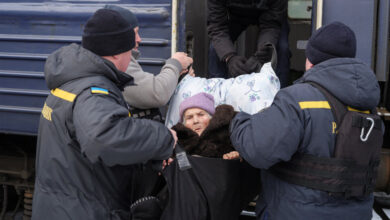Person one: Vulnerable Ukrainian farmers plowing and subsistence

Pierre Vauthier is the chief of staff of FAO in Ukraine. He told UN News about how FAO domestic team – about 100 employees, mainly Ukrainian specialists in agriculture-related fields – dispersed throughout the country, in often difficult working conditions.
“One of the difficulties we faced, when the war started, was that many of our colleagues were forced to leave their homes and move to safer areas. Despite this challenge, we managed to respond quickly to the needs of those affected.
From April we started distributing seeds, mainly to people who have been forced to leave their homes and have taken refuge in villages where they feel safer and have a better chance of finding shelter. .
Those on the front lines or occupied areas suffered greatly.

Pierre Vauthier, Head of FAO’s Country Office for Ukraine, at the distribution of agricultural equipment in Chernihivska in November 2022.
Agribusinesses, especially the larger ones, were severely impacted at all levels, but turned out to be extremely resilient and demonstrated the ability to reorganize and resume operations.
On the other hand, small-scale farmers, small businesses and rural families are very vulnerable; they produce food for the rest of the country and are in need of humanitarian aid.
More than 30,000 households have received seeds and cash transfers from FAO and this has helped strengthen the local economy and build resilience.
FAO’s goal is to remove half a million households, or one million people in rural areas, from humanitarian assistance by the end of 2023 and help them become self-sufficient, thereby contributing to recovery. rural economy.
Avoid the collapse of agricultural production
In 2022, Ukraine’s ports, which export more than 80-90% of the country’s grain to countries in Africa and Asia, were blocked.
To prevent a complete collapse of agricultural production, FAO in collaboration with the government and partners was able to purchase and provide storage capacity of nearly 6 million tons of grain. This means that farmers, many of whom have lost their infrastructure to the war, can hoard their produce and avoid losses.
This ultimately saved the 2022 harvest and stabilized the global situation.

United Nations agencies have helped ensure that generators for food production can continue in Ukraine.
priority 2023
A 30% to 40% reduction in agricultural output due to war will have a significant impact on the national economy and food security, so it is important to support agriculture.
FAO has set up a special program to support farmers in frontline areas by providing seeds so they can maintain production.
We have also distributed generators, with German support, so that food producers and other elements of the food chain have continued strength. So, for example, we provided generators to the big bakeries in Kiev and Kherson so they could bake bread.
FAO is also working to reduce fossil fuel consumption in the agricultural sector and explore options such as solar energy and biofuels.
And it is important that FAO is working with the World Food Program (WFP) to identify and prioritize land that needs demining and restoration to ensure the safety of farmers and enable agricultural production to take place safely and efficiently as soon as possible.
An estimated one million hectares of land are affected by landmines and unexploded ordnance left in the fields.

Solidarity among farmers
I am impressed by the solidarity of the farmers in Ukraine, who are motivated to restart production, resume normal life and provide agricultural products to their communities, despite the hardships. affected by circumstances beyond their control.
In that sense, their preoccupation with harvesting, raising, maintaining production and selling to the market is very similar to that of other farmers I have met around the world in places like Mali. , Ethiopia, South Sudan and the Central African Republic.
Work continues despite the challenges
The ongoing war is complicating humanitarian operations, especially in areas where military activity is intense.
Almost every day we had to go to the bunker for protection, but we kept working.
Security remains a major concern, especially for our employees, who often live on the outskirts of the cities where we are based. But we remain vigilant about exposing ourselves to unnecessary risks.”




